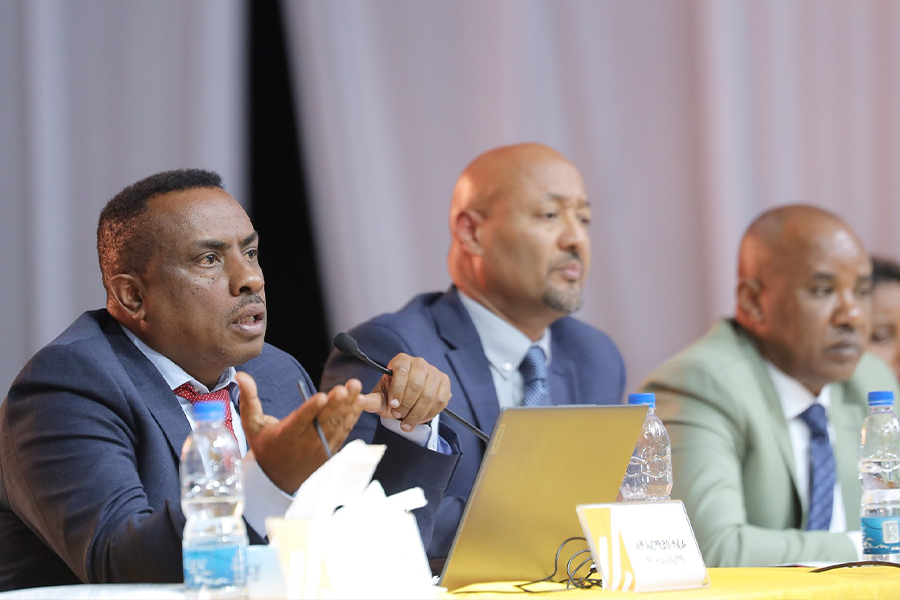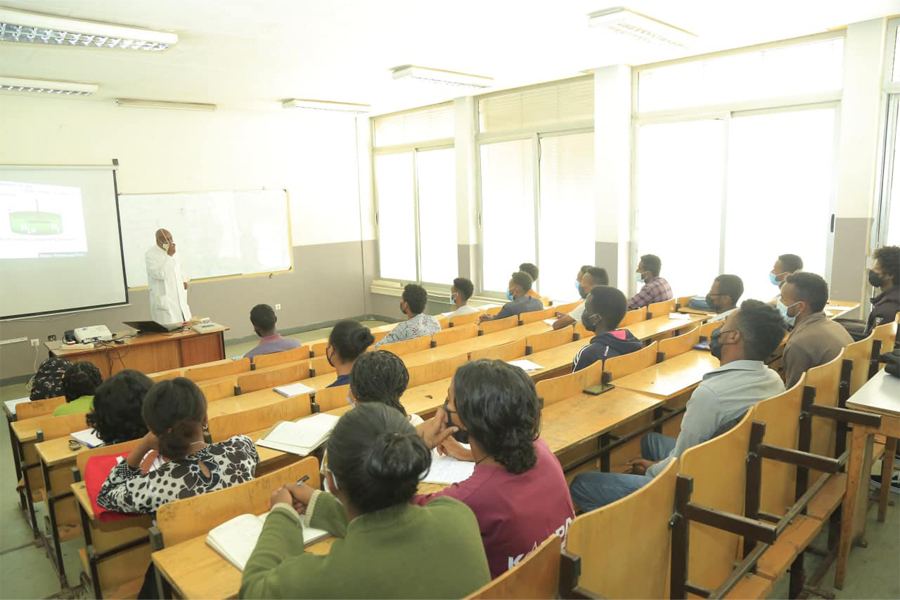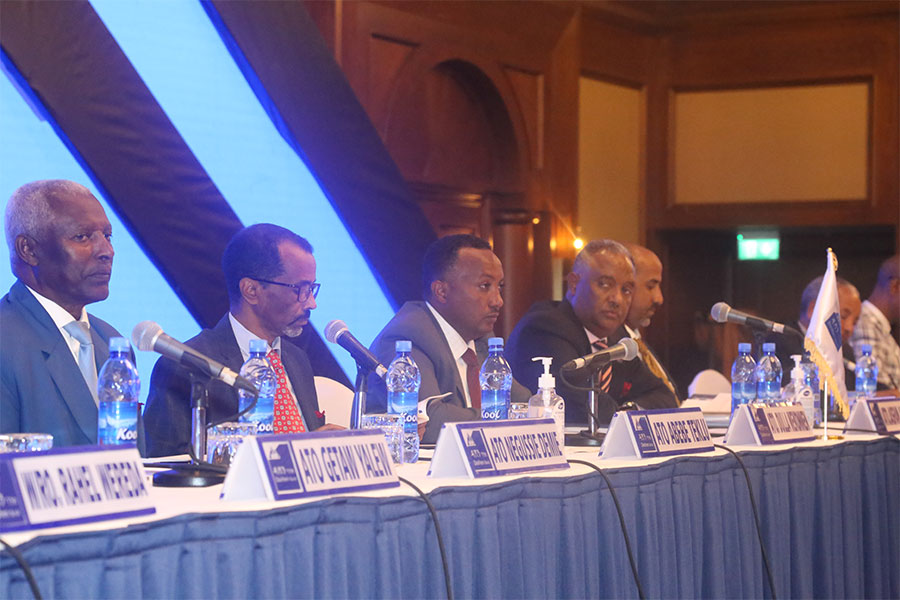
Minilik Tesfaye, a graduate of Adama Science & Technology University in computer science, owns a year and a half old text messaging service company, Highest Technology Plc.
Last month he was supposed to renew his business license and went to the former Ministry of Communication & Information Technology office to renew his certificate of competence.
The certificate is a prerequisite to obtaining a business license from the Standardization & Regulation Directorate of the Ministry of Communication & Information Technology. The Directorate issues competency certificates for technology companies that provide services, manufacture, import and install telecom equipment and consultancy services in information technology.
First-time users apply online, and then the institutions process the request, reviews the documents and notify their clients by text message to correct any errors. The system then sets up an appointment date to present original documents, pay the service fees and pick up their certificates.
The online service was launched by the Ministry to enable people like Minilik to start processing their applications electronically, only needing to show up at the Ministry once their certificates are ready to pick up. His experience renewing his certificate was smooth and surpassed his expectation of having to wait for days.
“I am lucky," he told Fortune, smiling. "I received my final renewal in 15 minutes."
The whole process, from filling the application online to obtaining the final copy of the certificate of competence took Minilik two days. Since the launch of the service, a total of 5,000 businesses and individuals have used the system. The Directorate, which is in the process of re-establishing itself as the Telecom & Postal Regulatory Agency, joins the Federal Transport Authority and 15 other institutions in using the E-Government gateway. The electronic service system was launched in 2015 as a government platform for online services and is hosted by the Ministry of Innovation & Technology.
As the lead agency, the Ministry has the power to control the E-Government portal system at all institutional levels. The Ministry conducts feasibility studies before bringing government institutions onto the platform. It gives priority to those bodies that are experienced, have redundant back and forth activities and are vulnerable to corruption.
The E-Government system aims to make the institutions transparent, feasible, confident and to enable them to deliver cost-effective services, according to Tesfaye Lemma, media and press director at the Ministry. The system also benefits the public by delivering higher quality service and minimizing the time it takes in processing documents.
However, the constant network interruptions hinder the system from being fully utilized, and the Federal Transport Authority is one of the institutions experiencing this problem.
Transport buero regestration online.
“We are facing constant internet interruptions, sometimes in the middle of issuing certificates," said Aynadis Tilahun, information communication technology officer at the Authority.
Users also do not have confidence in the reliability of the internet service and often prefer to appear in person at the institutions to process their documents.
Seid Mohamed, who is in the process of obtaining a certificate of competency to open a new automobile garage in Jemo district, is one of them. Last month he was present in person at the Authority to process his application.
“I would be interested in using the service, but the internet is unreliable, so I do it personally," he said.
In addition to internet interruptions, some officials in the institutions create obstacles for clients requiring direct contact with corrupt intent, according to Aynadis. The Authority has put online about half of its registered services with the rest still pending. Among the Authority’s services are issuing various permits for vehicle imports, cross-border freight trucks, assemblers and manufacturers, automobile garages and inland transportation.
The old process used to take a long time and was sluggish, according to Yordanos Teshale, a businessperson who imports cars and tractors. Even though the service was started about three years ago, it only received traction recently.
The Accounting & Auditing Board of Ethiopia, one other top-ranked government institution, has been using the E-Government system since last July. Currently, the Board provides new certificates and renewals for accountants and auditors; accounting and auditing firms; registers financial reporting entities and services more than 200,000 users.
The Board provides its services to private limited companies, non-governmental organisations, Ethiopian Commodity Exchange members, banks, insurance companies and small and medium-sized enterprises with an initial capitalisation of one million Birr or more.
A software developer, Lemma Eshetu, applauds the Board’s online service, but he highlights some deficiencies. "There is a network problem in attempting to upload files," Lemma told Fortune.
Banks and insurance companies report huge data files, and because of this, often cannot use the E-Government system effectively. Therefore, they hand carry their audit documents to the Board offices, according to Lemma. The institutions claim the number of users utilizing the website is still low. To create awareness about the service, the Board is using different promotional methods including social media platforms and announcements on its website, according to Abebe Shiferaw, communications directorate at the Board.
“There is a high turnover in our office, especially during the final days of the annual reporting period,” said Abebe. "To avoid these, we're encouraging our clients to use the online system."
Bereket Alemu, an authorised auditor with a decade of experience who uses the E-Government system of the Board, said, “The system has simplified my task, especially shuttling back and forth from office to office.”
The Ministry of Water, Irrigation & Electricity has lately joined the E-Government system and is offering 11 online services including new registration and renewals of professional licenses, registration and renewal of company licenses and upgrading of professional licenses.
Asnake Zemenay, license and certification director at the Ministry, is not satisfied with the service.
“At least one computer and scanner should be available at each office to help our clients. Also, there is a lack of understanding on how to use the system," he said.
Internet interruption is a challenge often cited by users at the Ministry.
Betseha Nahusenay, a 2006 graduate of Addis Abeba University in Geological Science in 2006, is currently working at Aqua Con Engineering Plc, a local company engaged in water drilling activities.
“I tried to process my application using the E-Government system," he lamented while waiting in a long queue at the Ministry, "but the internet connection prevented me from processing the application online.”
"I am unable to upload my files, even after an hour’s wait,” he added.
The Ministry of Innovation and Technology has already recognised the problem, according to Tesfaye, media and press director at the Ministry.
"Network interruptions are real challenges facing the system," he told Fortune.
The Ministry is working on different fronts - moving the huge national data centre from the National Palace to the Ministry; working closely with Ethio telecom; and providing training to government organisations in the basic concept of how to use the E-Government system, according to Tesfaye.
While still attempting to fix the prevailing issues, the Ministry plans on increasing the number of institutions that use the electronic platform.
The Ministry is discussing with the National Election Board to run the upcoming election using the E-Government portal platform, according to Tesfaye.
On the other hand, the service has been an additional source of income for internet café owners like Tigist Melakebrhan, who runs Akila Internet Café and Stationery around Gollagul Tower in Haya Hulet.
She used to process her clients’ applications and upload scanned files for at least seven clients a day, completing the tasks in 15 minutes and charging 50 Br for her services.
“Our customers come to apply for certificates to the Ministry of Water, Irrigation & Electricity," she said.
Wubete Nigusse, an expert in computer applications and a lecturer at Kotebe Metropolitan University with a decade of experience, believes and trusts that the system will help fight fraud and corruption.
He states that the online system will help the government and customers reduce costs and save time and money.
"Additionally, the online system should create accuracy and reduce fraud and corruption,” he said.
PUBLISHED ON
Feb 02,2019 [ VOL
19 , NO
979]

Radar | Nov 05,2022

Fortune News | Apr 03,2023

Commentaries | Apr 29,2023

Fortune News | Feb 25,2023

Agenda | Aug 25,2024

My Opinion | Feb 17,2024

Fortune News | Nov 27,2022

Agenda | Feb 18,2023

Editorial | Mar 25,2023

Fortune News | Apr 22,2023

Dec 22 , 2024 . By TIZITA SHEWAFERAW
Charged with transforming colossal state-owned enterprises into modern and competitiv...

Aug 18 , 2024 . By AKSAH ITALO
Although predictable Yonas Zerihun's job in the ride-hailing service is not immune to...

Jul 28 , 2024 . By TIZITA SHEWAFERAW
Unhabitual, perhaps too many, Samuel Gebreyohannes, 38, used to occasionally enjoy a couple of beers at breakfast. However, he recently swit...

Jul 13 , 2024 . By AKSAH ITALO
Investors who rely on tractors, trucks, and field vehicles for commuting, transporting commodities, and f...

Oct 25 , 2025
The regulatory machinery is on overdrive. In only two years, no fewer than 35 new pro...

Oct 18 , 2025
The political establishment, notably the ruling party and its top brass, has become p...

Oct 11 , 2025
Ladislas Farago, a roving Associated Press (AP) correspondent, arrived in Ethiopia in...

Oct 4 , 2025
Eyob Tekalegn (PhD) had been in the Governor's chair for only weeks when, on Septembe...